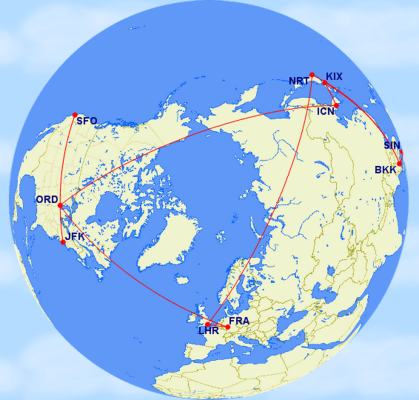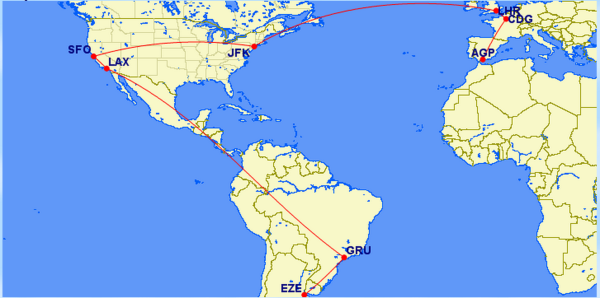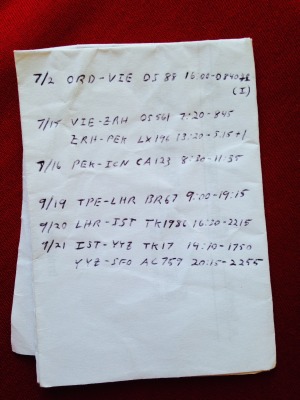Winning the Hearts and Minds of Airline Phone Agents: A Complete Diagnostic Guide
This may be old hat for more seasoned readers, but I tried to compile all the conventional wisdom for booking awards with agents over the phone. Feel free to forward to friends or family members that are about to book their first “complicated” awards.
Within the frequent flyer community, there is a common mantra when dealing with airline call center agents. Hang Up Call Again (or HUCA in flyertalk parlance), meaning that when attempting to book, change or cancel a flight, you will get a wide range of responses of what is possible, and these may vary dramatically from what the rules actually say.
Examples from personal experience would include being told that Air Canada does not fly Santiago to Buenos Aires (they do), overnight connections are never allowed on international trips (they usually are if less than 24 hours), Kenya Airways is not in Skyteam (it is) and that Bangkok is, ostensibly, in Hong Kong and not Thailand (wouldn’t that be a fun city!).
Obviously this is more of a training issue and call center agents do endure insufferable, uninformed customers and have to say “NO” quite often. I used to dread talking to airline agents and would block several hours on a Saturday with the expectation that it would actually take that long (and sometimes it did).
It’s no secret that I like to maximize every possibility out of an award ticket, but as with any hobby or skill, practice makes perfect and I’m now comfortable in calling up an airline and getting flights booked, in many cases on the day of departure. It’s all about having a system and being extremely prepared. Here are a few tips to make the award booking process as painless as possible.

UA Award for 140k miles last year (likely not bookable anymore with routing rule changes) SFO-ORD-ICN-KIX-BKK-SIN, BKK-NRT-LHR-FRA-ORD-SFO, SFO-JFK

Delta Open Jaw (booked last February) SFO-LAX-GRU-EZE, EZE-GIG, AGP-CDG-LHR-JFK-SFO
Make sure you’re calling the right airline and know your account number
Many people starting out will book an award ticket on say united.com including a flight on Lufthansa. Closer to departure they may see that a business class seat opened up and will sit on hold with Lufthansa, only to be told that the ticket was issued by United (hence the ticket number starts with 016) and only United can make changes.
Remember that you ALWAYS talk with the issuing airline for changes made to an award, except seat assignments and catering/book the cook requests. The operating carriers will not help you with changes or rebookings unless there was a delay or cancellation on their part. Even then, you may want to call the issuing carrier to make sure the rest of your itinerary is intact and doesn’t get cancelled.
Come with your account number in hand. Some airlines won’t even connect you to an agent without it. Making them wait while you rummage the house isn’t going to win you any points either.
Always be unflappably polite and friendly
I always open award booking calls with a cheerful tone and ask a little about the agent, where they are based and how the weather is. It’s very important to establish a bit of humanity since the vast majority of people they interact with are purely in the realm of transactional conversations. I make sure to remember the agent’s name and work on a first name basis if it sounds natural to do so. If they’re especially good, I let them know! (“Wow Charlie, I’ve worked with a ton of agents from <airline> and you’re one of the most courteous and quick agents I’ve ever met”), This costs me nothing and you get the chance to make someone’s day.
Having a little small talk and humanity dramatically increases the chance that you’ll have a cooperative agent, and many times they will bend the rules or make exceptions for you, waiving a fee or allowing a slightly longer than 24 hour layover. Not saying this is a rule, nor that you should be insincere, but things go way better when you’re both in a good mood.
Subtly establish credibility by knowing the ICAO alphabet, airport codes, carrier designations and general airline parlance
For changes and basic interaction, take some time to memorize the ICAO alphabet. It’s much smoother to start a “Change Reservation” conversation with “Hi Cheryl, I’d like to make a change to my itinerary. My record locator is Alpha, Hotel, Three, Papa, Victor, Seven.” The more you can sound like a travel agent, the smoother everything will go. Small changes like a date or cabin shouldn’t take more than 5 minutes.
Similarly, using industry vocabulary tends to make agents give you the benefit of the doubt that you know the rules and know what you’re talking about. I often sprinkle in terms like these:
- Use “Record locator” or PNR (passenger name record) instead of “reservation”
- “Segment” or “leg” instead of “flight”
- “originating in AAA” “to XXX — which is the destination”, “stopover in YYY”, “open jaw back from ZZZ”
- “Taiwan, which is in Asia 1”
- “The outbound is from North America to South America 2 and the return is an open jaw from Europe to North America”
- “The operating carrier is Lufthansa right?” - know the difference between the operating carrier and marketing carrier (offering the flight as a codeshare)
Setting expectations early is also critical. I often begin the conversation along the lines of “I have a complicated itinerary, but I’ve already done the legwork and have a list of segments with availability on the dates of travel. Let me know how you would like to input them.”
Most importantly, the agent should not have to do any searching for you - Leave nothing to chance

Have your entire itinerary written out segment by segment and ensure there is award availability for each leg before you call
When I call in, I have a list of every segment on a piece of paper and I’ve already checked that there is award availability on sites like Expertflyer, united.com, britishairways.com or the ANA search tool. It includes the following fields, which I have been found absolutely necessary to leave nothing to chance.
- Date (I often group flights together than depart on the same calendar day)
- Origin-Destination (airport codes - because the agent will sometimes ask)
- Carrier call sign (UA, OS, TG, AC etc) - Always use the operating carrier, not codeshares - typically codeshares will be numbers in the high thousands - e.g. LH 7790 is likely not on LH
- Flight number (Be aware that sometimes there are direct flights - again a confusing practice - from AAA-BBB-CCC - make sure they are searching the right city pair - they also typically count as one segment, in case you’re trying to max out routing rules, so omitting the intermediary point is perfectly fine - e.g. BR67 stops in BKK, going TPE-BKK-LHR, but counts as one segment, and I just list it as TPE-LHR)
- Departure Time and Arrival Time (+/-1 day if applicable because this can sometimes trip agents up - time travel!) It helps to have the arrival time in case the agent raises questions about minimum connecting time (rare) or thinks you have too long of a connection (more common). I usually put it in 24h format so there’s no possibility they’re searching 9am instead of 9pm.
- Fare class letter (differs by airline - only star alliance is aligned across carriers - double check that the agent is searching the right bucket or else you may end up in coach on a business award - looking at you Delta!)
Sometimes I’ll include equipment type if it’s important to me (usually mostly for awards in premium cabins where the difference can be a narrowbody blocked middle seat or a widebody fully lie flat seat or suite. It can help midway through to confirm those details so that there is no miscommunication.
Most agents will ask for the date first, though a few prefer to start with origination city first. I find that emphasizing the carrier and flight number creates less room for error since it (usually) references one flight, while “Frankfurt to Tokyo departing at 3pm” might be imply a ANA or Lufthansa flight (or Asiana or Air China connecting through their hubs if the agent is just parroting what the computer pulls up).
This does require more time to assemble, but it’s extremely important to have every piece because many times the award search engines will not pull up - and aren’t designed to pull up - the same connections. Countless times agents have told me there is no availability on a route for a particular day until I give them a flight number and fare class. Magically, they can see it then. Similar to hotels that have no suites to upgrade to which magically appear when you point it out that they are still selling suites on their website.
Waiting to validate and price - Be super nice and patient
Especially with complicated itineraries, it will take the airline a few minutes to validate and price the itinerary. Sometimes an agent will get a supervisor to double check that your 12 segment itinerary is indeed valid. In these situations, they’ll usually put you on hold, where I usually reply “Oh that’s no problem, take all the time you need!”
If everything goes according to plan, you can book a complicated itinerary in 20 minutes.
What are your favorite tips/voodoo/jedi mind tricks that you employ when booking complicated itineraries? Comment below!

Good write up. On a side note, United stock is 016, not 006.
006 is Delta….
“NATO alphabet”? I believe you mean ICAO. That’s where it was developed and standardized. If NATO has picked it up subsequently, good for them, but it’s the ICAO (and much more relevant to aviation). As an aside, most of the call center agents you speak with are going to be in India and The Philippines, neither of which are NATO members (although India *is* the official ICAO acrophonic for the letter “I”).
Otherwise, excellent advice, and pretty much exactly what I always try to do.
One additional suggestion: If the agent does a reasonably good job, at the conclusion of our business I will compliment and thank them, then ask if I could pass along positive feedback to their supervisor about the excellent service they provided to me. Sometimes they will just say thanks and decline, sometimes they’ll provide an email address, occasionally they’ll connect me to a supervisor right there. I have had several agents who were completely delighted when I offered this. You can imagine that they often take a lot of crap from callers (most of who must be as dumb as a rock), and frequently have complaints leveled at them (often due to the callers’ lack of knowledge or unreasonable expectations). On the rare occasion that someone asks to speak with a supervisor to actually PRAISE them, it makes their day. Remember, they are human beings with feelings, good days and bad, just like the rest of us.
Thanks for the corrections! Updating right now.
Offering positive feedback is a great idea and can certainly help good agents rise through the ranks to elite lines that are intended to provide more capable and expedient service. But I agree, end of the day, they are people too and should be commended for a good job!
While you are on hold it is possible for the agent or supervisor to listen in. I like to have a conversation with my wife (even if it is an imaginary one) telling her how great the agent is and how lucky I am to have such a good agent that can help me. I have no way to know if one of these fake conversations has been herd, but it can’t hurt!
As a former airline reservations agent, I absolutely agree with your advice. It is EXTREMELY important not to get on an agent’s “bad side” and be polite at all times. You can’t imagine how many times, agents that deal with rude customers would make a notation in the PNR (or even the FF account sometimes) that really kills your shot at getting anything other than strict adherence to the “rules”:)
Interesting, I know agents can annotate PNRs, but didn’t know they can annotate your entire account. How do those notes usually look? “Difficult customer” “Does not understand geography” or “Prefers fewer connections” “Prefers window seating”
It is rare, but for instance at the airline I worked for we had a an ability to make a remark on the FF software. It would usually happen if a pax was really, really, really unbearable and unreasonable. Typical remarks would say stuff like: “very rude”, “do not auth any refunds / comps unless absolutely necessary” etc.